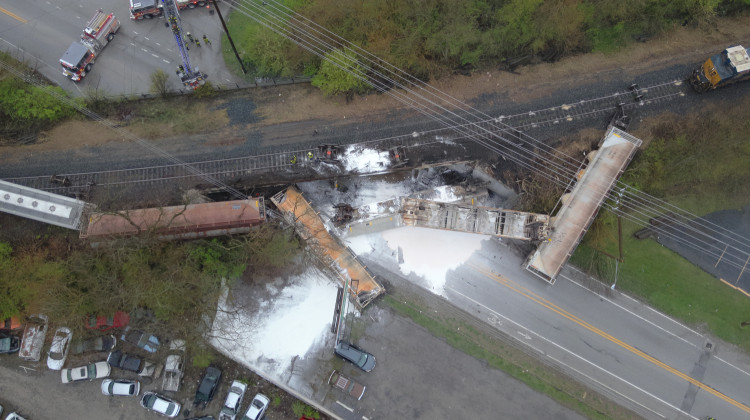A teenage boy said that a female staffer at an Indiana youth treatment facility gave him lollipops and performed oral sex on him. More than a dozen similar incidents of abuse have surfaced at Pierceton Woods Academy. But the state kept sending boys there anyway, according to a new investigation by the IndyStar and ProPublica. WFYI’s Darian Benson spoke with reporters Tony Cook and Emily Hopkins about their investigation.
The transcript of the interview has been edited for style and clarity.
Darian Benson: I want to start with Emily. Your investigation is centered around an organization called Lasting Change. What do we know about it?
Emily Hopkins: So, Lasting Change is a faith-based nonprofit organization based in northern Indiana. It manages several companies, including Pierceton Woods Academy, which is a 48-bed residential facility that treats boys for substance use disorders and sexually harmful behaviors. Lasting Change is also the parent company to Lifeline Youth & Family Services, which provides home-based child welfare services for the state of Indiana and is the Indiana Department of Child Services’s largest contractor. And the last thing to note here is that it has some deep political connections in Indiana. Former Vice pPresident and Indiana Governor [Mike Pence] is a supporter. He has spoken at fundraisers for Lasting Change companies. And its current CEO, Tim Smith, is currently running for a Republican campaign for Congress.
Benson: And Tony, you've both spent months reporting the story. What prompted you to start looking into this specific facility – Pierceton Woods Academy?
Tony Cook: Yeah, I first heard about Lasting Change when it was lobbying at the State House for liability protections. And that's when we learned, primarily from information gathered as part of a lawsuit, that there were multiple allegations of sexual abuse there. And then Emily was pursuing a similar line of reporting. And so we decided to team up.
Benson: In your investigation, you found that the Department of Child Services didn't do enough to protect children. And it even continued to funnel millions of dollars despite evidence of abuse happening there. Emily, can you tell us more about how this happened?
Hopkins: What we found was that Pierceton Woods Academy’s internal policies instructed staff members to report allegations of abuse to supervisors, before reporting it to DCS or to police. In some training materials that we obtained, it even showed a flowchart where an allegation of abuse would travel up the chain of command from direct care staff to the director of the facility, who would then determine if that was even worth reporting to DCS. So, we found this policy, but we also found that DCS knew about this policy, had asked Pierceton Woods to revise the policy, and had approved a subsequent policy that included the same instructions to staff to report allegations to supervisors before the state or to police, which our experts have told us that that runs counter to the law –– which says that you need to report allegations of abuse to DCS or police immediately. Even four hours is too long to wait in some cases.
We also obtained emails that show that DCS frequently screened out reports of abuse allegations that they received. So, we found that there were like 17 reports from 2017 to 2021 that they screened out, which means they just didn't look into it, they didn't investigate it. And in at least two of those cases, the records indicated that DCS declined to look into allegations involving staff members at Pierceton Woods, who were later found either by a police investigation or a subsequent DCS investigation to have in fact abused residents.
Benson: The story includes many shocking and troubling details, what struck you the most while reporting the story?
Cook: For me, I think it's that you have a place that's supposed to provide a safe environment for vulnerable teenagers to get [the] treatment that they need, and many of them have been abused [before] themselves. And so, to have them be victimized in a place like that is just really damaging, obviously. And it's a bad thing, not just for them, I think, but for society in general, because, you know, the consequences of this could play out in any number of ways. And you know, both the kids and society will probably pay for it for a long time.
Benson: Tony and Emily, thank you for your time.
Cook: Thanks for having us.
Hopkins: Yes, thank you.
Contact WFYI health reporter Darian Benson at dbenson@wfyi.org.
 DONATE
DONATE







 Support WFYI. We can't do it without you.
Support WFYI. We can't do it without you.